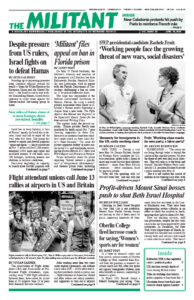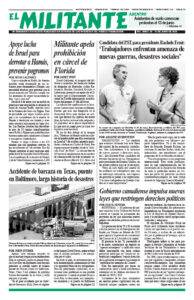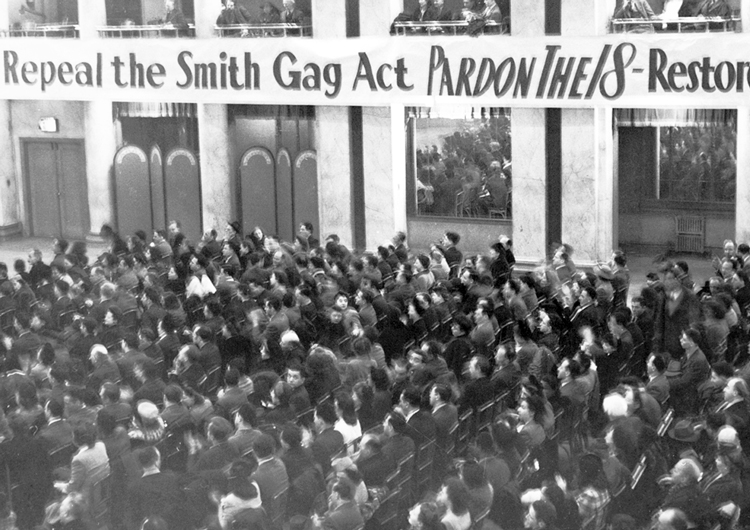The Socialist Workers Party in World War II: Writings and Speeches, 1940-43 by James P. Cannon is one of Pathfinder’s Books of the Month for June. In his Oct. 2, 1942, report, “The workers and the Second World War,” excerpted below, the “anticipatory crisis” Cannon refers to was a 1939-40 political fight in the SWP against a petty-bourgeois opposition. Buckling under Washington’s patriotic pressures as the U.S. rulers drove to enter the war, the opposition abandoned the SWP’s course of building a proletarian party in both program and composition and defending the Soviet workers state, despite its counterrevolutionary degeneration under Joseph Stalin. From exile in Mexico, Russian revolutionary leader Leon Trotsky led this successful political fight. Copyright © 1975 by Pathfinder Press. Reprinted by permission.
Capitalism today signifies permanent war and universal militarism. And from this conception we draw our tactics and our strategy. We foresaw the war. We prepared for the war, and we understood that the war would pose all the social problems for solution by military means. That is why our program is a war program, a military program, which excludes any form of pacifist abstentionism. That is why our ranks are animated by the conception that in the arena of militarism, which is today the main arena, we will learn how to participate and how to prevail.
We meet ten months after the formal entry of the United States government into the war. The Second World War is a continuation of the First World War, but not a simple repetition by any means. A continuation signifies, as Comrade Trotsky wrote, a sharpening and a deepening of all the features of the war. And just as this war is not a simple repetition of the first one, although a continuation, neither is the situation confronting the revolutionary vanguard, nor its tasks and its problems, a simple repetition of the situation and the tasks and the problems of the revolutionary vanguard at the outbreak of the First World War and during its course.
All the differences are in our favor, if we understand the situation to the bottom. The decay of capitalism, which was signalized by the First World War, has become the death agony of capitalism in the Second World War. The enemy, in spite of all superficial appearances, is weaker. On the other hand, the vanguard of the proletariat is better prepared and stronger today than it was in the analogous period of the First World War. …
The First World War produced deep crises in all the workers’ parties; the real discussion of the attitude to be taken toward the war began only after the war was under way. The war even produced discussions and splits in the ranks of the workers’ vanguard. There were defections among the Bolsheviks. This is history that is perhaps unknown to many comrades because Bolshevism has been represented as something that was born perfect and carried through to victory without any internal difficulties or errors or defections. Not true at all. Bolshevism, like every other current in the workers’ movement, grew and developed in the tests of action and took its final shape only in the fire of great events. …
War greatly intensifies and multiplies the pressure of bourgeois society on the workers’ vanguard. All the force of material and moral pressure of bourgeois society is brought to bear in the most intensified manner at the time of the declaration of war and immediately following. …
[W]e are healthy, we are free from a war crisis … because we cured ourselves of the petty-bourgeois sickness in good time. We had the good fortune to have an anticipatory crisis before the United States entered the war, a crisis which we conquered with the help of Trotsky. We secured our internal peace by a timely preventive war. …
The war was declared on the very same day that we were sentenced — December 8, 1941. That certainly was a symbolic coincidence. Nothing could better symbolize our irreconcilable opposition to the imperialist war, and to the capitalist state preparing and waging the war; and nothing, also, could better symbolize our enemies’ recognition of our attitude than this unexpungeable fact: that they declared war and sentenced the party leaders to prison on the same day and at the same hour — December 8, 1941.
There is not and there has never been the slightest possibility of misunderstanding our position on the war. We were given the opportunity on December 8 — the day of our sentencing — to recant. On December 8, the very day that the radios were blaring with jingo speeches in Congress preceding the declaration of war, the defendants were given an opportunity to disavow what they had said in the trial. Nobody did it. Thus our first response to the war was an action in court, a thousand times more important from a political point of view than any ritualistic statement.
A statement, after all, doesn’t constitute a fight against the war. There are some people who don’t know that yet. A statement is a promise to oppose the war. But our stand in the Minneapolis courtroom was the thing itself. …
The Fourth International is the genuine historical movement, not made arbitrarily, but really expressing the historical course of development and this historic mission of the proletariat. …
Anglo-American imperialism does not and cannot recognize Hitler’s conquest of Europe. Hitler’s domination of Europe means inevitably a further clash with America and England, as a minor partner, for the conquest of the world. Imperialistic interests forbid them to let Hitler have Europe in “peace” to exploit and incorporate in his so-called new order. That is why the war in Europe is still going on and will continue to go on until the workers end it by revolution. For this the workers need more than ever their own independent organization and their own independent program. …
The fact that the workers in Russia took power, the fact that they had a party able to lead the victorious struggle for power — this gives us the assurance for all time that the workers are capable of producing such a party and such a leadership in other countries and on an international scale.


